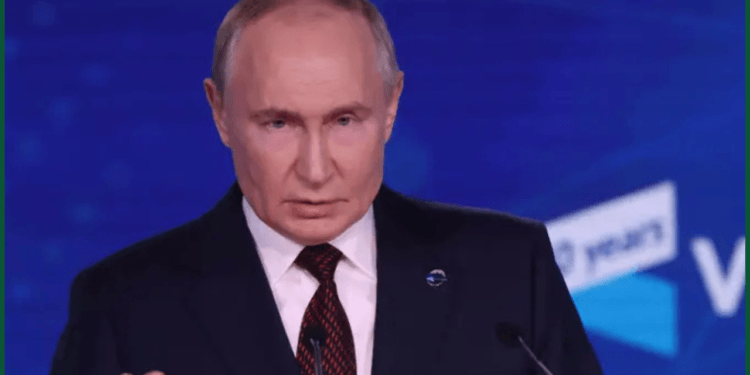In a fiery address delivered during an Arctic forum in the pre-dawn hours of Friday, Russian President Vladimir Putin intensified his campaign against Ukraine, calling for the establishment of a “transitional administration” to replace President Volodymyr Zelensky’s government. The remarks, paired with a vow to “finish off” Ukrainian forces, underscore Putin’s renewed ambition to install a pro-Moscow regime in Kyiv, even as U.S. President Donald Trump advocates for a ceasefire to halt the conflict that has raged since February 2022.
Putin’s latest statements come amid a shifting geopolitical landscape, bolstered by warming ties between Moscow and Washington since Trump’s return to the White House. The U.S. leader’s threats to scale back support for Ukraine have emboldened the Kremlin, which has struggled to achieve its initial goal of a swift takeover of Kyiv more than three years ago. Instead, Russia has faced fierce resistance from Ukraine’s outmatched but determined forces, resulting in tens of thousands of casualties on both sides.
Speaking to a small audience of officials and journalists, Putin proposed that Russia, the U.S., Europe, and Moscow’s allies convene under United Nations oversight to orchestrate Ukraine’s political overhaul. “The aim is clear: to hold a democratic election that brings a legitimate, competent government to power—one capable of negotiating a lasting peace,” he said. Yet, his vision of “democracy” appeared laced with irony, given his own 25-year tenure, secured through elections widely criticized as uncompetitive.
The Russian leader also took direct aim at Ukraine’s military leadership, urging generals to oust Zelensky, whom he baselessly labeled a “neo-Nazi” and “drug addict.” Putin further questioned Zelensky’s legitimacy, pointing to the expiration of his initial term in May 2024—ignoring Ukraine’s wartime suspension of elections, a measure supported even by Zelensky’s domestic rivals.
Kremlin spokesman Dmitry Peskov later doubled down, accusing Kyiv of losing control over its forces, which he claimed were relentlessly targeting Russian energy infrastructure. Peskov hinted that Moscow might abandon its self-imposed moratorium on striking Ukrainian energy sites if such attacks persisted, despite Ukraine’s reports of Russian strikes on its grid, including a massive drone assault overnight that ignited fires in the south.
On the ground, Russia’s defense ministry touted incremental gains, announcing the capture of a village in Ukraine’s Kharkiv region and the reclamation of a border settlement in Kursk. “We are moving forward—steadily, confidently—toward the objectives of our special operation,” Putin declared, signaling no intent to relent despite Trump’s peace overtures.
Ukraine, meanwhile, decried the escalation. Andriy Yermak, a top aide to Zelensky, accused Russia of sabotaging peace efforts with its latest barrage of 163 drones. “Moscow chooses war over dialogue,” he said. The Kremlin, in turn, shifted blame to Europe, with Peskov criticizing the EU for obstructing a Black Sea grain deal by refusing to ease sanctions on a Russian bank.
As Trump’s ceasefire push falters, Putin’s gambit raises the stakes, blending battlefield bravado with diplomatic posturing. With no end in sight, the conflict’s toll continues to mount, leaving the world to wonder whether peace or conquest will prevail.

















































